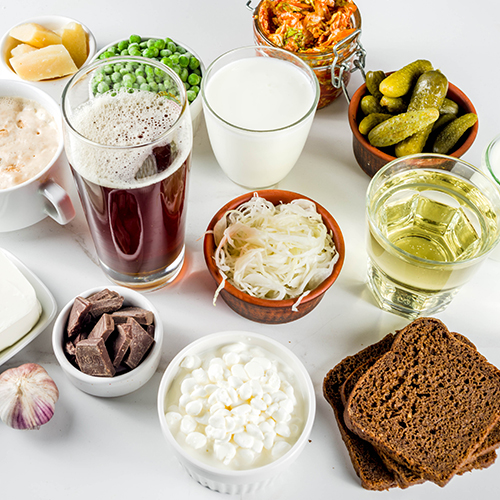When it comes to health and wellbeing, probiotics pop up in all sorts of unexpected places. Perhaps the most unexpected? As a skin care substance. While we know probiotics are beneficial for gut health, is it true that they are beneficial for skin health? How do probiotics even help your skin? Read on to find out everything you need to know about probiotic skin care and why you need it in your routine.
What are probiotics?
In short, probiotics are "good bacteria" that are critical to balancing out the "bad bacteria" in the body. How given by WebMD: "Probiotics are live bacteria and yeasts that are good for you, especially your digestive system." Probiotics are considered beneficial because they can help repopulate good bacteria that can be lost due to diet, medication, or certain health conditions, leading to more bad bacteria than good bacteria.
Probiotics are live bacteria and yeast that are good for you, especially your digestive system.
Common sources of probiotics are fermented foods, with yogurt being one of the most famous, but also sauerkraut, miso, kombucha, and even cucumber! When we talk about the benefits of probiotics, we usually refer to the gut flora, which is made up of hundreds of microorganisms to ensure that your metabolic activities stay healthy and effective. However, probiotics can also be used to cure skin conditions.
Can Probiotics Help Your Skin?
While dietary probiotics have been Scientific studies show that probiotics can also be beneficial for the skin. Not only can a healthy gut improve inflammatory skin conditions, but topical probiotics can also help balance the bacteria associated with conditions like acne and eczema. Acne has shown itself to be one of the most promising conditions to treat with topical probiotics as bacterial imbalances and inflammation contribute to certain types of acne. Applying probiotics to areas affected by these conditions can help relieve relapses, normalize and reset the skin's natural bacteria and moisture balance.
How should I use probiotics on my skin?
While, as always, there are plenty of DIY probiotic face mask recipes out there, we do It is not recommended to make your own kitchen preparations. This is because applying products to your skin that are intended for food consumption often varies greatly in their content of beneficial ingredients. For example, many probiotic foods contain ingredients like lemon and vinegar. While acids are in principle skin-friendly, these types of acids in food can irritate the skin and cause extreme sensitivity to light and even severe burns. Especially if you are dealing with a skin condition like acne or eczema where the skin is already feeling rough and sore, please avoid homemade solutions and instead look for professional probiotic skin care products that meet industry-wide safety requirements.
Probiotic skin care products are most effective when they can be massaged into or left on the skin. This allows the probiotics to positively influence the moisture barrier and balance the skin. Depending on your skin type and concerns, you may not need probiotics for every step of your skin care routine and you may prefer to include them in just a few areas. For example, if you have dry skin and are dealing with eczema or a strange blemish, using a probiotic face mask once a week is an excellent option. If you're an oily skin type looking to treat more common blemishes, including probiotics with your daily cleansing and moisturizing, as well as a weekly face mask, is an excellent way to help your skin balance out the bad bacteria that may contribute to breakouts .
The advice of a beautician
We asked for further recommendations Eminence Organics Senior skin care trainer Natalie Pergar to share her thoughts on probiotic skin care for an updated In The Mix video.
https://www.youtube.com/watch?v=21vT82KEJ1o [/ embed]
Natalie makes some amazing home care recommendations for using probiotic skin care. Some of our favorite takeaway dishes:
- Probiotics come from nature and help balance good and bad bacteria in the body.
- Probiotics can come from a supplement or fermented foods, but they are also found in skin care products.
- In skin care, this good and bad bacterial balance affects the skin's moisture barrier.
- Since 60% of our skin is made up of water, we want to make sure that our skin stays healthy with balanced hydration.
- All skin types and skin conditions can use the probiotic products Eminence Organics Clear Skin.
- The Clear Skin Probiotic Cleanser is ideal for combining with oily skin types with a gentle foam effect that offers a super clean, pore-tightening effect.
- The Clear Skin Probiotic Masque works wonderfully directly on the skin for people with a combination of oily skin types and is fantastic when mixed with a little water or our Stone Crop Masque for people with normal to dry skin types.
- The Clear Skin Probiotic Moisturizer can be used over a serum for people with a combination of oily skin types and as a serum – under your moisturizer – for people with normal to dry skin types.

With Natalie's amazing tips and explanation, we hope you feel safe trying out probiotic skin care products. Are you already using Eminence Organics Clear Skin probiotic products? Do you swear to include probiotics in your diet? We'd love to hear from you. Let us know your thoughts on probiotics in the comments or join the conversation on social media.

